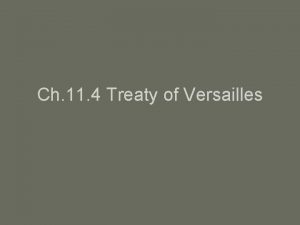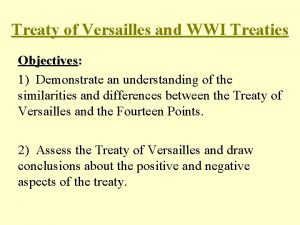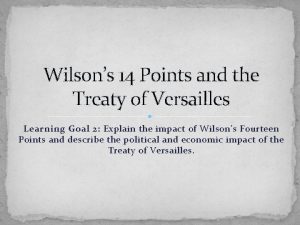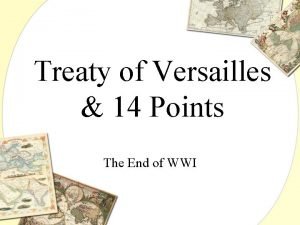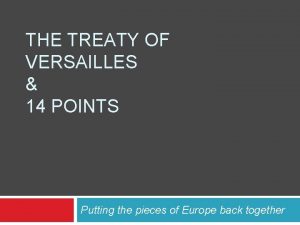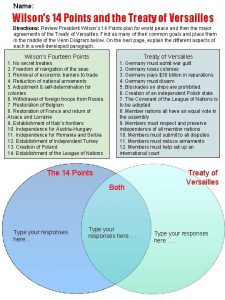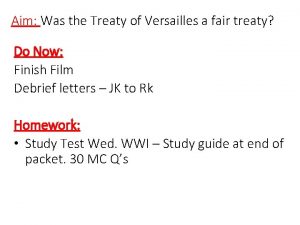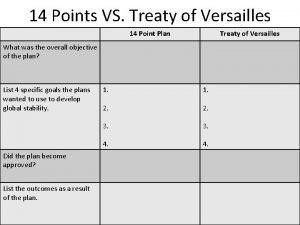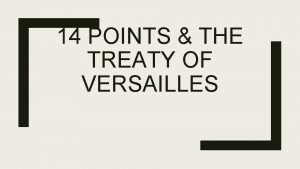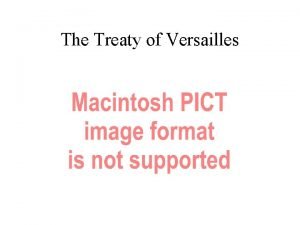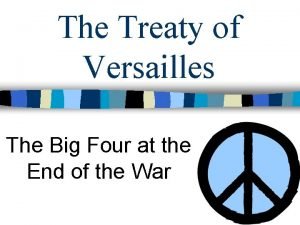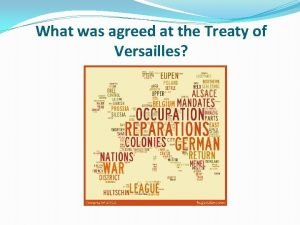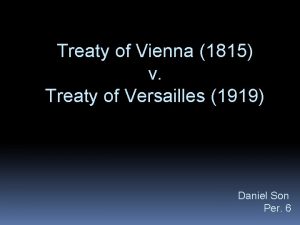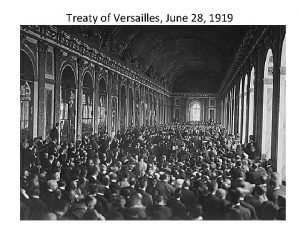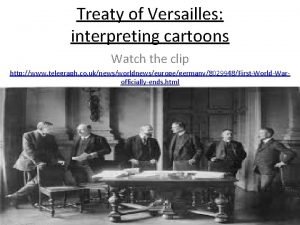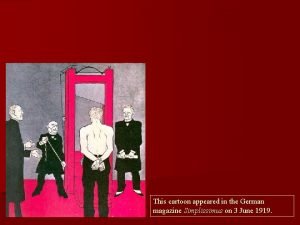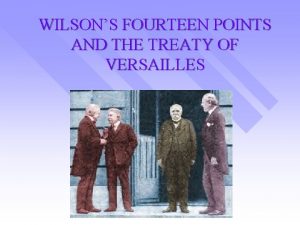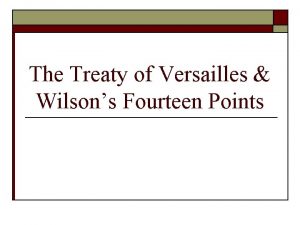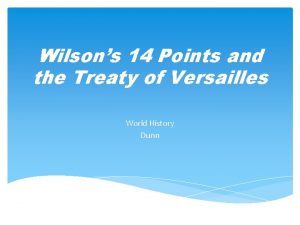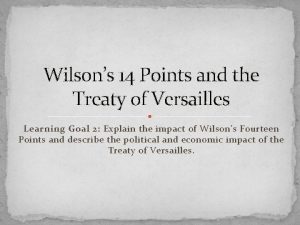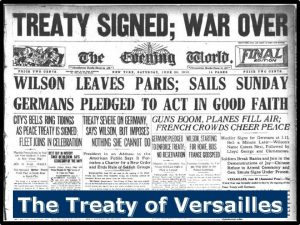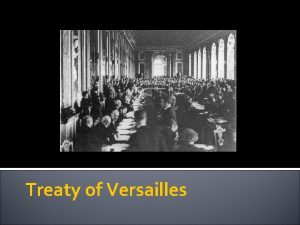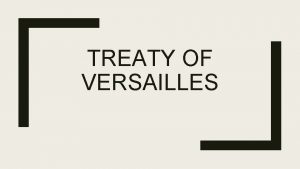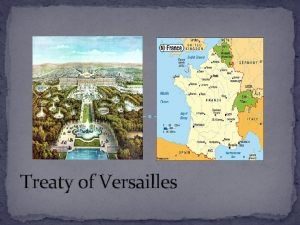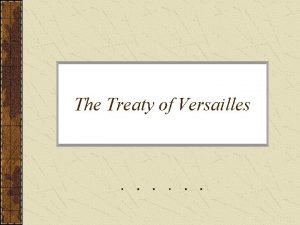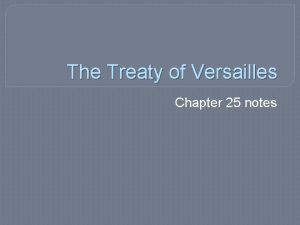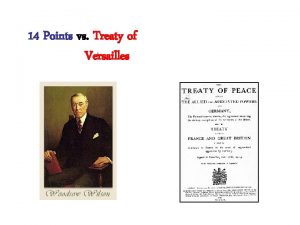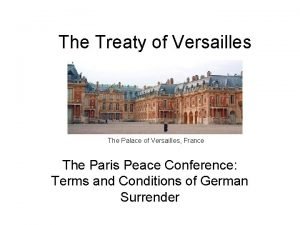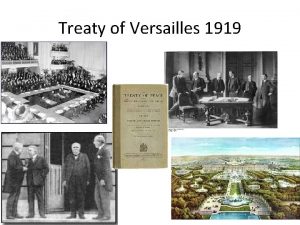WILSONS FOURTEEN POINTS AND THE TREATY OF VERSAILLES

















- Slides: 17

WILSON’S FOURTEEN POINTS AND THE TREATY OF VERSAILLES

WORLD WAR I ENDED IN 1918 n n n As a result of its role in World War I, the United States emerged as a dominant global power. President Woodrow Wilson wanted to make World War I the war to end all wars. He went to France to help write the peace treaty.

VERSAILLES CONFERENCE n n Wilson came to the peace conference at Versailles with suggestions for a fair and equitable peace treaty. These suggestions were called Wilson’s Fourteen Points.

Examples of Wilson’s Fourteen Points

League of Nations An organization in which the nations of the world would ensure security and peace for all members n “An attack on one is an attack on all. ” – But not with military power n Meant to be a place to “talk it out” before wars would happen n

Casualties of the War n n n Total casualties: 37 million Total killed in WWI: 10 -11 million 1 in 8 young men in France died 62% of all European men fought at some point in the war. Total wounded in WWI: 30 million Total amount spent directly on the war: $180, 000, 000

“THE BIG FOUR” WHO WROTE THE TREATY OF VERSAILLES Great Britain n United States n France n Italy n

WHAT THE TREATY SAID ABOUT GERMANY n n n n Reduce its army to 100, 000 men and not allowed to have conscription or draft soldiers into their army. Reduce the navy to 6 warships and was not allowed to have any submarines. Destroy all of its air force. Give land to Belgium, France, Denmark and Poland. The land given to Poland became known as the "Polish Corridor”, and it separated the main part of Germany from East Prussia. Hand over all of its colonies. Agree to pay reparations to the Allies for all of the damage caused by the war; these came to £ 6, 600, 000. Put no soldiers or military equipment within 30 miles of the east bank of the Rhine. Accept all of the blame for the war, the "War Guilt Clause".

THE TREATY CHANGES THE MAP n n n The Treaty established nine new nations--the Adriatic coast was made part of a new country called Yugoslavia, which included Serbia and Bosnia. Poland, Lithuania, Latvia, Estonia and Finland were formed from land lost by Russia. Czechoslovakia and Hungary were formed out of the Austro-Hungarian Empire. The boundaries of other nations were shifted

Europe 1914 When War Began

Europe after the Treaty of Versailles

GERMANY IS GIVEN A NEW GOVERNMENT n n The Allies also gave Germany a new form of government based on proportional representation. It was intended to prevent Germany being taken over by a dictatorship, but it led to the creation of more than thirty political parties; none of them was big enough to form a government on its own.

GERMANY’S REACTION TO THE TREATY n Most Germans were horrified. Germany had not been allowed to attend the peace conference and was told to accept the terms or else. Many Germans did not believe that the German army had actually been defeated in 1918 because Germany had not been invaded. n Several of the clauses of the treaty were thought to be very harsh. It was going to be almost impossible to pay the reparations (the German government gave up after only one year) and the War Guilt Clause seemed particularly unfair. n It was felt that Germany had simply been made a scapegoat by the other countries for all that had happened.

STRENGTHS OF THE TREATY OF VERSAILLES It ended World War I. n The League of Nations was formed. n Poland was reconstructed. n The Austria-Hungary Empire, the German Empire and the Ottoman Empire were divided into modern countries. n Estonia, Latvia and Lithuania were recreated from Russian territory. n

Weaknesses of the Treaty n n n The Treaty of Versailles was written up by the allied powers without any input from the Germans. It failed to create a lasting peace. The treaty was unfair to Germany in many ways. It forced demilitarization of the Rhine, an elimination of the German air force and near elimination of the German navy, and a maximum allowance of 100, 000 troops in the German army. The Germans were forced to give up the territories of Alsace and Lorraine to France, and a great deal of Prussian territory went to the new state of Poland. To be given the opportunity of signing a peace treaty at all, the Germans were forced to accept a democratic government.

EUROPE AND THE UNITED STATES DIFFER OVER THE TREATY n n n The European leaders were not interested in a just peace. They were interested in retribution. Over Wilson's protests, they ignored the Fourteen Points one by one. Germany was to admit guilt for the war and pay unlimited reparations. German colonies were handed in trusteeship to the victorious Allies. No provisions were made to end secret diplomacy or preserve freedom of the seas. New nations’ borders did not reflect self determination. Wilson did gain approval for his proposal for a League of Nations.

UNITED STATES DOES NOT SIGN THE TREATY n n Some senators did not agree that the United States should sign the treaty Stated that joining the League would weaken American Independence Believed it would lead the United States to join more wars November 1919, League of Nations would be voted on. – 39 for, 55 against
 Wilson's fourteen points and the treaty of versailles
Wilson's fourteen points and the treaty of versailles Fourteen points and treaty of versailles similarities
Fourteen points and treaty of versailles similarities Wilson's 14 points vs treaty of versailles
Wilson's 14 points vs treaty of versailles Wilson's 14 points vs treaty of versailles
Wilson's 14 points vs treaty of versailles 14 points vs treaty of versailles
14 points vs treaty of versailles Comparing the 14 points & treaty of versailles
Comparing the 14 points & treaty of versailles 14 points compared to the treaty of versailles
14 points compared to the treaty of versailles 14 points vs treaty of versailles
14 points vs treaty of versailles Treaty of versailles 14 points
Treaty of versailles 14 points The big 4 and the treaty of versailles interactive notebook
The big 4 and the treaty of versailles interactive notebook Us and the treaty of versailles
Us and the treaty of versailles The big 4 treaty of versailles
The big 4 treaty of versailles Treaty of versailles the big three
Treaty of versailles the big three Treaty of versailles 1815
Treaty of versailles 1815 Article 231 of the treaty of versailles
Article 231 of the treaty of versailles Indicates
Indicates German satirical magazine
German satirical magazine Whats treaty of versailles
Whats treaty of versailles
